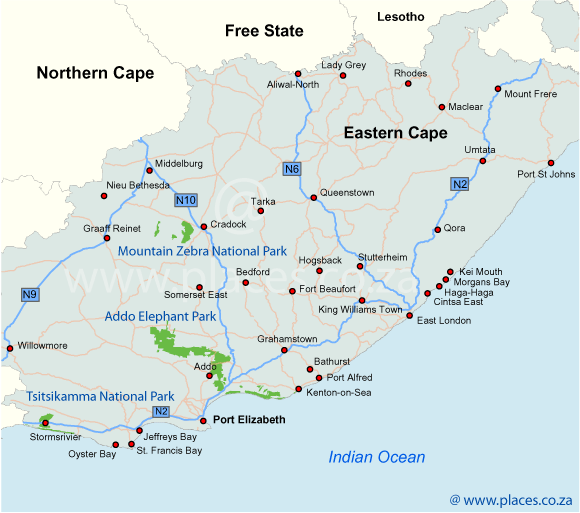Shooting this documentary was one of the most exciting parts of the adventure. It included the discovery of South Africa, a road trip with the unavoidable "slight problems" and some unforgettable encounters.
In total, we spent three weeks in South Africa - driving from Johannesburg, to Pretoria then down to the Eastern Cape, one of the most underdeveloped regions in the country with a 29% unemployment rate in 2009.
Our first stop there was East London. We finally met up with Vukile Pokwana, a local journalist who had been helping us setting up the shoot whilst we were still in Europe. A busy man - he is very involved in the cultural life of the Eastern Cape - Vukile also has a lot of experience fixing for international broadcasters, including Sky and the BBC.
We drove with our new guide further north, first to King William's Town to arrange an interview with local government officials and then to Alice (near Fort Beaufort on the map), a small town near where our story was unfolding. This is where we met local harvesters, community spokespeople, middlemen and the German company's supplier.
After 3 days in the pampa, we headed south to Grahamstown, another town famous for its university. We visited its herbarium and met the academic who alerted the African Centre for Biosafety that pelargonium was being heavily harvested.
On our arrival in Johannesburg at the end of our trip, we were greeted by football supporters from all over the world. A perfect ending.
7 October 2010
5 October 2010
The Edit

The edit is going well. We had a very productive editing cession with Jamie Riordan from Propeller Media yesterday. Jamie produced, directed and edited documentaries for Al Jazeera English, CNN, and Sky amongst others. He is now directing trailers in Qatar for Doha Film Institute.
Georgina and I came back from our shoot in South Africa and Germany with fantastic content. We managed to interview pretty much everyone we were after from NGO representatives, to the drug company's spokespeople, government officials and, of course, community members and pelargonium harvesters. We had to cut 22 hours of footage down to 26 minutes.
What we found most challenging in this edit was to give a clear analysis of the challenges faced by pharmaceutical companies prospecting plants in countries like South Africa, and also question the idea of "fair trade" looking at where it could be failing, through the story of the pelargonium plant.
There is only one way to find out if you think we succeeded in our mission and we hope you get to view the documentary soon wherever you are in the world.
1 October 2010
What we have been up to...
Making a film is a long process. In the next few days and weeks, we will be telling you about the different stages of production of our 26-minute current-affair documentary.
After five months working intensively on this project, Georgina and I are looking forward to sharing our thoughts and images with the rest of the world. We are currently finishing the edit, with the generous help of Sydney-based graphic designer Adrian Smith. Other journalists, editors and interns have helped along the way and we will make sure to mention them in coming posts. We would also like to take the opportunity to thank all those, friends and relatives, who contributed financially to this self-funded project.
At the moment, we are actively looking for broadcasters and festival organisers from all over the world interested in airing our story. Biopiracy is a hot topic at the moment. The Convention on Biological Diversity’s 10th conference of parties will be taking place in just a few days in Nagoya (Japan). A protocol on access and benefit-sharing will be widely debated and probably negotiated during the conference which could have a huge impact on drug companies.
If you would like to know more about our project, you can sign up for regular updates on our twitter account @perlagoniumproj or email us at pelargoniumproject [a] gmail.com

After five months working intensively on this project, Georgina and I are looking forward to sharing our thoughts and images with the rest of the world. We are currently finishing the edit, with the generous help of Sydney-based graphic designer Adrian Smith. Other journalists, editors and interns have helped along the way and we will make sure to mention them in coming posts. We would also like to take the opportunity to thank all those, friends and relatives, who contributed financially to this self-funded project.
At the moment, we are actively looking for broadcasters and festival organisers from all over the world interested in airing our story. Biopiracy is a hot topic at the moment. The Convention on Biological Diversity’s 10th conference of parties will be taking place in just a few days in Nagoya (Japan). A protocol on access and benefit-sharing will be widely debated and probably negotiated during the conference which could have a huge impact on drug companies.
If you would like to know more about our project, you can sign up for regular updates on our twitter account @perlagoniumproj or email us at pelargoniumproject [a] gmail.com

Subscribe to:
Posts (Atom)
